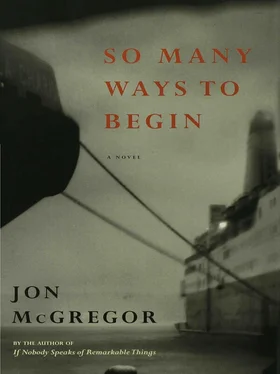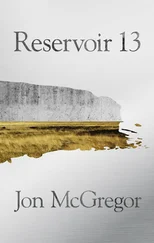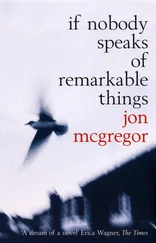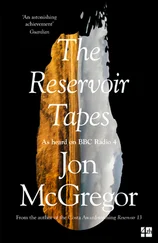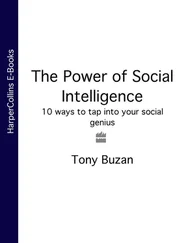Perhaps it was like that, he would think, sometimes, or perhaps it wasn't like that at all. Perhaps she went to Ireland, but never made it as far as home, kept away by fear, or by warnings of how she would be received. Perhaps she went to Dublin, an exile in her own country, finding a place to stay through someone who knew someone, finding work, making friends, pushing what went before to the back of her mind. Perhaps she married, had children, gave them names and raised them. Three children, four children, five children. Brothers and sisters born and bred in Dublin, and her northwestern inheritance didn't pass on to them but faded from view. Or perhaps she had no children, no more children, perhaps she didn't marry and she lived out her life further south, Waterford, Cork, nestling into some small village community and busying herself with work and the intricate weave of a new social life, and she grew old and built herself a new history to talk of in the village shop or at the club, fond talk of do you remember when with no need to think of what went before. Or she became a nun, clothed herself in righteousness and hid herself away in the cloisters and the rituals of religious life, praying and meditating and good-deeding her way out of the skin of the young girl she was when she first joined. Or she didn't go back to Ireland at all. She went as far as Liverpool, and put her savings together with a few weeks' work in a hotel kitchen, and bought herself a ticket to the New World, following in the wake of so many who had gone before, walking the gangplank aboard the White Star liner without a backward glance, keeping away from the deck until the ship was well clear of land so as not to have no one to wave to. Or she went back to London, losing herself in the crowds, walking out every day in the hope that she would bump into Julia, or Dorothy, or David; lingering by the hospital gates, waiting, hiding without hiding, never able to actually step inside. Or she went to Leeds, or to Birmingham, or to Coventry and she got a job in the Hotel Leofric and served David his very first under-aged pint. Or she died young, killed in various road accidents, explosions, struck down by illness and disease, drowned on her way to America, sodden with cheap drink in a one-room flat on the Kilburn High Road. Or she did go home, eventually, a few long years smoothing over the rough calluses of shame and gossip, a family's love and longing for a lost daughter overcoming any talk of sin and curse and letting down, a father brimming with tears as he brings himself to look her in the eyes and say, well, come inside, welcome home, it's been too long.
It was the not knowing, he would say to someone, much much later. The not knowing was the hardest thing.
He woke early, stiff and tired from the previous day's long drive but restless with preparations for the journey to come. He left Eleanor sleeping, her fists clenched against her face, and slipped into Kate's old room, looking out the two albums and the scrapbook he planned to take, glancing at all the other scrapbooks and albums and shoeboxes and wondering if he should maybe take a few things more. He went over the route in his mind, uncertain even now that he was doing the right thing, sitting down on Kate's old bed, smoothing the pillow and the duvet, looking at her old postcards still Blutacked to the back of the door.
He heard Eleanor getting up and moving around downstairs, and then she appeared in the doorway with two coffees, squinting slightly, her face puffed with sleep. She put one down on the windowsill, glancing at the pile of boxes and folders he'd been going through. She looked at him, the faint lines on her face softening as she smiled, and said you're a case though, aren't you David? He looked at her, sharply, and stood up.
What? he said.
Well, she said, waving her hand vaguely, all this stuff. I mean, it's a bit much, isn't it? He looked down at the floor, and then at the window, holding his hands tensely by his sides. He didn't say anything.
He said, Eleanor, couldn't you just for once take something I'm doing a bit seriously? I mean, couldn't you do me that favour, just once? He said, it's not as if I'm taking it all with me. I was just looking; what's wrong with that? He gripped the edge of the windowsill, and realised he was shouting. He said, I'm sorry but— She moved towards him and put a hand on his shoulder, and she felt him tense against her touch.
She said, I'm sorry I didn't mean anything. Her voice was flatter, the teasing note of a moment before drawn out of it by his reaction. She said, I am taking it seriously, it's just— It seems like you're rushing into this a bit.
He looked at her, disbelievingly, shaking his head.
She said again, I am taking it seriously.
He lowered his head and said well it doesn't feel like it. She sighed, loudly, and pulled away from him, moving towards the door.
I'm sorry love, he said, rubbing his forehead with the knuckles of his fist, I'm just tired. It was a long drive. She held on to the door frame, and closed her eyes.
It was the first argument they'd had for months. The last time had been when her brother Donald contacted them to say that her mother was very ill and would Eleanor consider going up there at all, and David had tried to insist that she should. She'd shouted at him then, and told him that he must be stupid if he still didn't get it after all these years, and he'd shouted back that maybe he was stupid, for marrying her in the first place. There was nothing like that being said this time at least. But there was something of that same bristling tension; in their voices, in the tight grip of their hands on the windowsill and the door frame, in the way their eyes dared one another to go further. Later, over breakfast, they would agree that they were getting too old for that kind of thing, that it wasn't worth getting so wound up about it all, and the sharpness of their words would be forgotten. But for a moment, as they stood there facing each other, trying to think what to say, it felt as though they were newly married all over again.
Perhaps you shouldn't go today then, she said quickly, if you're really so tired, if it was such a long drive. Perhaps you should leave it. He raised his hands, shaking them in the air.
But I've bought the ticket now, he said, almost shouting again. It's all been arranged. They'll be expecting me, he said, his voice suddenly trailing away and his hands falling to his sides. And something like resignation or defeat must have shown on his face, because when he looked at her he could see that she regretted what she'd said. Maybe I shouldn't go at all, he said. She let go of the door frame and stepped back towards him, touching a hand to his arm.
Oh no, she said. I didn't mean that, I didn't mean that. I'm just saying, she said, you said you were tired. He turned away from her, looking out at the small back garden. She said, I'll put some toast on. She left the room and went downstairs to the kitchen. The steam rose from his coffee mug, settling to a steady twisted stream as the stillness seeped back into the room. He glanced at the clock.
They were in the middle of breakfast, still catching breath from their brief argument, when the phone rang. It was his sister Susan, wanting to know how things had gone at the funeral. I'm not interrupting anything, am I? she asked.
No, David said, reaching across to the table for his toast, you're fine.
Only it seemed like a good time to call, she added. How had it been at the service, she asked, and afterwards — were people friendly enough, how did Kate take it all, had Eleanor changed her mind at the last minute? No, he said, she hadn't. She asked him how Kate was in general, if she was still living in London, if she'd had any luck finding a proper job yet.
Читать дальше
Конец ознакомительного отрывка
Купить книгу
